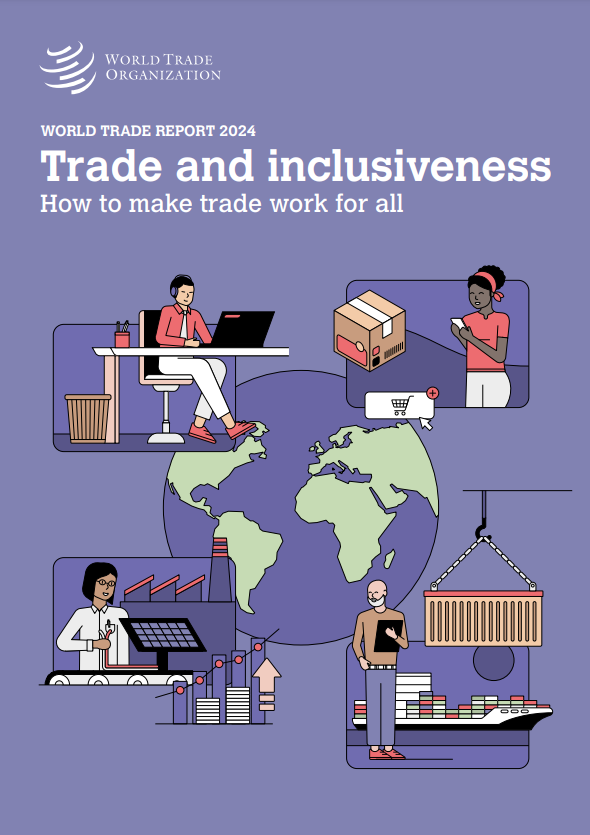
- 보고서는 보호무역주의 강화가 최빈국들에 가장 큰 타격을 주고 부유한 국가의 일자리 보호를 위해 비용이 많이 드는 비생산적인 방법이라고 지적하면서 세계 불평등 해소를 위한 '재세계화(reglobalization)'를 촉구함
□ 전 세계 무역 장벽은 2018년 도널드 트럼프 대통령 재임 시 광범위한 관세 도입과 2년 전 영국의 유럽연합 탈퇴 결정, 중국산 전기자동차를 겨냥한 최근 조치 등 지난 10년간 갈수록 높아지고 있음
- 그러나 보고서는 보다 나은 기술 접근을 위해 외국인 투자와 무역에 의존해야 하는 빈곤 국가들이 이러한 무역 장벽의 가장 큰 피해를 볼 것이라고 지적함
□ 응고지 오콘조이웨알라 WTO 사무총장은 “무역 규제가 통상 사회 내 특정 집단의 일자리를 보호하는 고비용 방안이며, 생산 비용을 높일 뿐 아니라 불만을 품은 무역 상대의 값비싼 보복을 불러올 수 있다”고 경고하였으며, 따라서 각국 정부는 보호 장벽을 높이는 대신 노동자들이 수요가 많은 새 기술을 습득하고 새로운 일자리가 창출되는 지역으로 쉽게 이동할 수 있도록 도와야 한다고 제언함
[출처] WTO “보호무역주의, 최빈국 타격…부유국에도 비생산적” (2024.09.10.) / 연합뉴스
목차
Title page
Contents
ACKNOWLEDGEMENTS 4
ABBREVIATIONS 6
FOREWORD BY THE WTO DIRECTOR-GENERAL 8
EXECUTIVE SUMMARY 10
A. Introduction 20
B. Trade and income convergence 32
1. Globalization has led to income convergence, but some economies have been left behind 34
2. How did the integration of low- and middle-income economies into global markets boost income convergence? 37
3. Why have some developing economies gained little from globalization? 42
4. Future opportunities for economic convergence lie in strategies to keep trade open and supported by complementary policies 57
5. Conclusions 65
C. Trade and inclusiveness within economies 68
1. Trade raises overall incomes and reduces poverty without necessarily increasing inequality 70
2. Most people gain from trade but some suffer losses 73
3. Fairer trade policies and domestic complementary policies are crucial to make trade more inclusive 88
4. Inclusive trade is set to undergo transformation amid emerging global trends 93
5. Conclusions 96
D. Inclusive trade and international cooperation 98
1. Ensuring that the WTO leaves no economy behind 100
2. Making the WTO and trade more inclusive for people and firms 120
3. Promoting inclusive development through enhanced international cooperation 126
4. Conclusions 137
E. Conclusions 140
Bibliography 143
Table B.1. Differences between fast-growing economies and those lagging behind 36
Table B.2. Opportunities, challenges and strategies to enhance trade-led development 63
Figure A.1. Significant real GDP convergence but more limited average real GDP per capita convergence, 1995-2022 22
Figure A.2. Export growth of environmental and digital trade significantly higher than other goods and services, 2005-23 24
Figure A.3. Positive correlation between trade participation and per capita GDP growth, 1995-2021 25
Figure A.4. Positive correlation between changes in trade openness and changes in employment, 1995-2022 26
Figure A.5. Greater poverty reduction in WTO members than non-WTO members, 1990-2022 27
Figure A.6. Increasing trade between low- or middle-income economies, 1995-2022 29
Figure B.1. Positive correlation between low- and middle-income economies' convergence speed and trade participation, 1996-2021 34
Figure B.2. Many low- and middle-income economies are lagging behind, 1996-2021 35
Figure B.3. Faster income convergence due to trade costs reduction, 1995-2020 41
Figure B.4. Higher trade costs in lower-income economies relative to high-income economies, 2020 43
Figure B.5. Positive correlation between LDCs' preference utilization and preference margin size, 2022 44
Figure B.6. Growing number of concerns about SPS and TBT measures raised by low- and middle-income members, 1995-2023 45
Figure B.7. Fewer trading partners in RTAs signed by lower-income economies, 2023 46
Figure B.8. Limited trade facilitation implementation in lower-income economies, 2015 and 2023 47
Figure B.9. Higher FDI regulatory restrictiveness in lower-income economies, 2020 55
Figure B.10. Positive impact of digitalization on global average annual trade growth, 2017-40 59
Figure B.11. Higher export growth in digitally deliverable services under a convergence scenario, 2017-40 61
Figure C.1. Substantial poverty reduction alongside increased trade openness in low- and middle-income economies, 1995-2022 70
Figure C.2. Limited reduction in income inequality amidst greater trade openness 71
Figure C.3. High global inequality despite a significant decline 72
Figure C.4. Lower global income inequality amidst higher global wealth inequality, 1988-2021 73
Figure C.5. Increasing share of employment embodied in exports, 1995-2019 74
Figure C.6. US export shares by US state aggregates, 1960-2021 75
Figure C.7. Relatively limited share of workers in import-competing industries, 2019 80
Figure C.8. Lower participation of MSMEs in international trade 84
Figure C.9. Lower participation of firms owned by women in international trade 86
Figure C.10. Lower participation of the US rural population in international trade 87
Figure C.11. Lower share of low-skilled workers in exporting firms 88
Figure C.12. Stronger correlation between inequality and education or taxation than trade openness, 2022 91
Figure D.1. Contribution of multilateral and unilateral reductions to the global average MFN tariff rate, 1996-2023 100
Figure D.2. Lasting positive impact of GATT/WTO membership on trade 101
Figure D.3. Low tariff binding coverage and high bound tariffs and tariff gap in lower-income economies, 2022 102
Figure D.4. Higher cumulative share of peaked tariff lines in lower-income economies, 1995-2023 103
Figure D.5. Higher economic growth and capital investment in WTO members with more extensive commitments 104
Figure D.6. Greater participation of lower-middle income members in negotiations through joint proposals, 1995-2023 109
Figure D.7. Greater participation of less-integrated members in committee work through joint questions, 1996-2016 110
Figure D.8. Lesser participation of lower-income members in dispute proceedings, 1995-2023 111
Figure D.9. Higher number of outstanding notifications in members with lower government capacity, 2022 111
Figure D.10. Association of deeper WTO commitments with greater poverty reduction 121
Figure D.11. Increasing numbers of provisions on inclusiveness in RTAs, 1990-2021 133
Boxes
Box B.1. Viet Nam's export-driven structural transformation and FDI-driven export upgrading 38
Box B.2. FDI-driven economic diversification and upgrading in Costa Rica 40
Box B.3. The role of remittances for development 48
Box B.4. Availability of trade finance in West Africa and in the Mekong region 49
Box B.5. The challenges of using SEZs to improve trade participation and attract FDI in Africa 56
Box C.1. Global inequality has fallen recently 72
Box C.2. Winners from trade may change over time 75
Box C.3. Putting studies on import competition shocks in context 79
Box C.4. Trade and indigenous peoples 85
Box C.5. Microtech opportunities in developing economies 95
Box D.1. Development considerations have progressively been integrated into the GATT and WTO 106
Box D.2. WTO measures to increase the integration of LDCs into global trade 107
Box D.3. The economic importance of cotton for LDCs 116
Box D.4. Due diligence and responsible sourcing in supply chains 134
Box D.5. Policy space to adopt labour-related trade measures in the WTO 136
Opinion pieces
Leveraging trade to foster a more inclusive digital economy in Africa 60
The complex interplay between inequality and attitudes about globalization 92
Soft rules and the informational role of the WTO 114
Can regional and multilateral trade liberalization work in tandem? 129
The promise and pitfalls of responsible sourcing in global value chains 135



